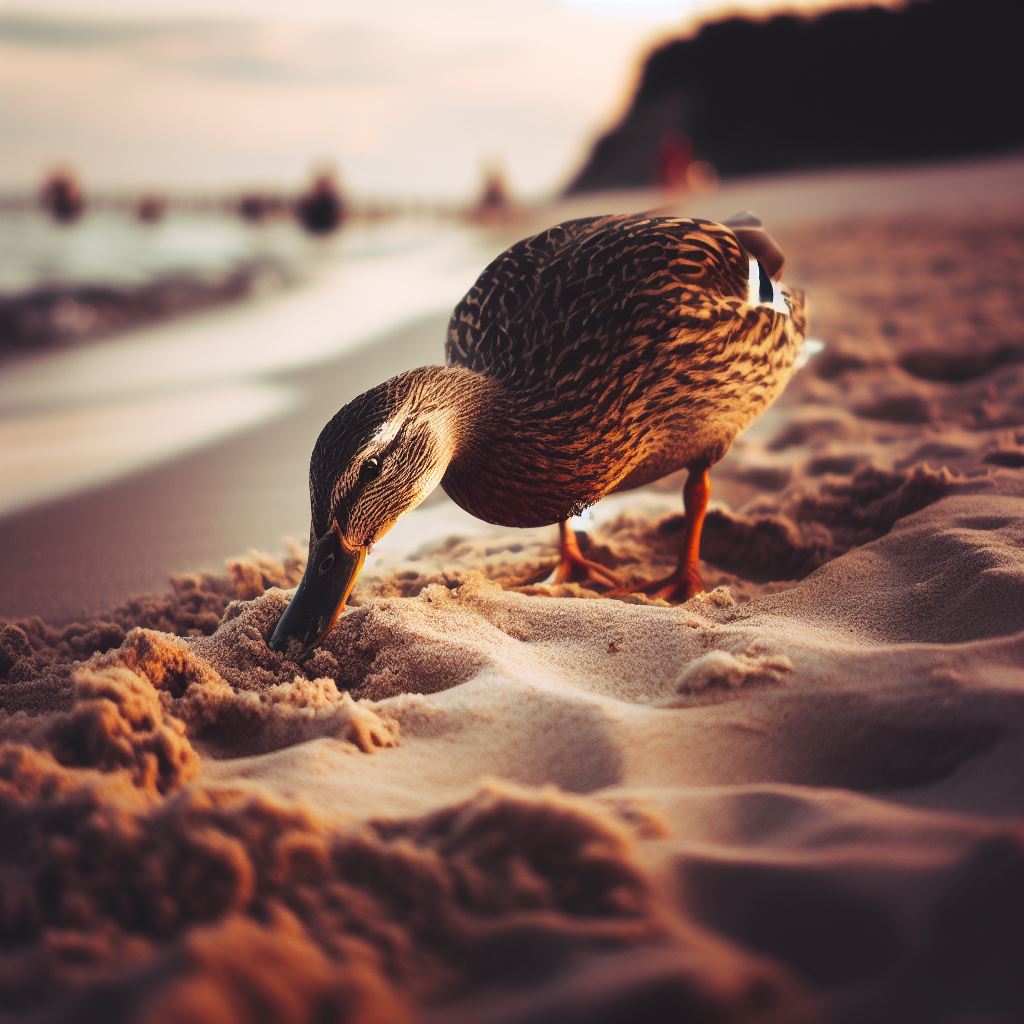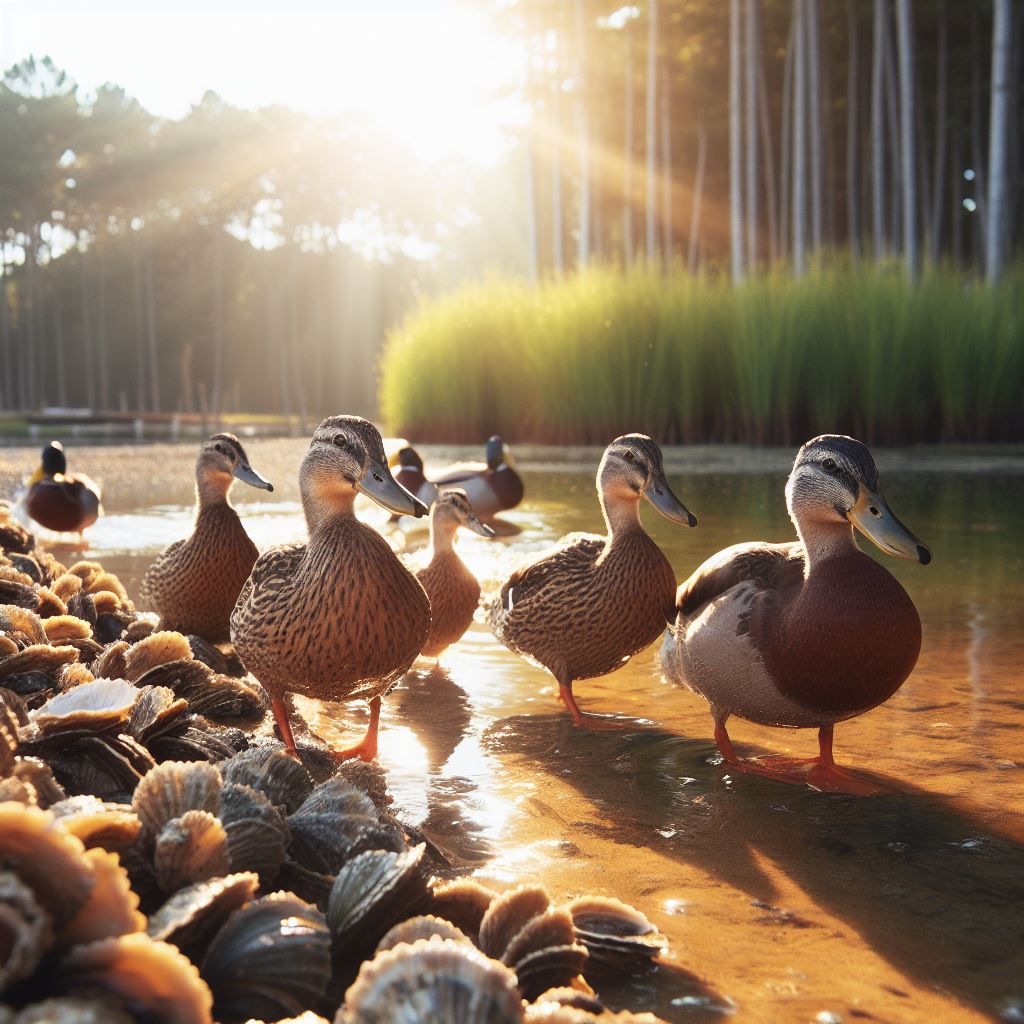Can Ducks Eat Seaweed? Everything You Need to Know

Table of content:
- What Types of Seaweed Can Ducks Eat?
- Fresh vs Dried Seaweed for Ducks
- Feeding Ducks Seaweed From the Beach
- How Much Seaweed Should Ducks Eat?
- How to Prepare and Serve Seaweed for Ducks
- Can Ducklings Eat Seaweed?
- The Nutritional Benefits of Seaweed for Ducks
- Potential Risks of Feeding Ducks Too Much Seaweed
- Can Seaweed Be Toxic to Ducks?
- FAQs About Feeding Ducks Seaweed
- Conclusion
Can ducks eat seaweed? Seaweed can provide nutritional and health benefits to ducks when fed properly and in moderation. However, not all types of seaweed are suitable and overconsumption can be harmful.
Understanding which seaweeds, preparations and amounts are safe and duck-appropriate is key. This complete guide covers everything you need to know about feeding ducks seaweed.
Key Takeaways:
- Seaweed provides nutrients like protein, vitamins, minerals and antioxidants beneficial for duck health.
- Ducks can eat a variety of seaweeds like nori, kelp, sea lettuce and kombu in fresh or dried forms.
- Limit seaweed to 1-2 times per week at 2-5% of the diet to avoid nutritional imbalances or hyperthyroidism.
- Fresh seaweed should be washed; dried seaweed should be rehydrated, chopped and mixed with grains or pellets.
- Monitor portions and duck health when feeding seaweed and provide plenty of fresh water.
What Types of Seaweed Can Ducks Eat?
Ducks can safely enjoy a diverse array of sea vegetables. Common edible seaweeds include:
- Nori: Dried and roasted nori sheets are duck-friendly and packed with nutrients. It is often used in sushi rolls.
- Kombu: This kelp variety is rich in iodine and often used in soups. Chopped, dried kombu is suitable for ducks.
- Dulse: With high iron and B vitamins, Atlantic dulse is a healthy duck treat when dried and shredded.
- Sea Lettuce: These green algae have high vitamin K, iron, and magnesium when fed fresh or dried.
- Kelp: Ducks can eat most kelp species like sugar kelp, winged kelp and giant kelp in moderation.
Some seaweeds to avoid include:
- Sargassum: This brown algae contains thyroid-suppressing compounds and should be avoided.
- Hijiki: It may contain arsenic and excess iodine harmful to ducks’ health.
Always inspect seaweed carefully, especially if foraged, and confirm identification before feeding ducks. When in doubt, avoid.
| Common Edible Seaweeds | Seaweeds to Avoid |
|---|---|
| Nori | Sargassum |
| Kombu | Hijiki |
| Dulse | |
| Sea Lettuce | |
| Kelp |
Fresh vs Dried Seaweed for Ducks
Seaweed can be fed to ducks fresh or dried:
- Fresh seaweed is more nutritious and packed with antioxidants, vitamins and minerals. It contains more moisture and bioactive compounds.
- Dried seaweed is more concentrated and provides a more intense flavor. It has higher sodium content. Rehydrating dried seaweed before feeding is recommended.
- Both forms need to be washed, cleaned and chopped into bite-sized pieces for ducks to safely consume.
For ease, purchase processed seaweed supplements labeled for poultry consumption rather than harvesting seaweed yourself. This helps avoid location-specific pollutants.
Feeding Ducks Seaweed From the Beach
Exercising caution when feeding ducks seaweed foraged from the beach is important:
- Harvest sustainably without damaging the environment. Only take a small amount.
- Thoroughly wash the seaweed to remove sand and debris.
- Inspect closely and discard seaweed that looks damaged, rotten or fouled.
- Parasites or bacteria in raw seaweed can cause duck illness. Freezing harvested seaweed for 3 weeks kills parasites.
- Beach pollution and marine toxins can concentrate in seaweed. Farmed varieties or processed supplements are safer options than foraged seaweed of uncertain origin.
How Much Seaweed Should Ducks Eat?
Seaweed should comprise no more than 2-5% of a duck’s total diet. Feed just 1-2 times per week in small amounts as a treat. Reasons to limit intake include:
- Thyroid dysfunction risk: Excess iodine in seaweed can cause hypothyroidism or hyperthyroidism.
- Nutritional imbalances: Overreliance on seaweed versus grains, legumes, greens and proteins leads to deficiencies.
- Gut health: Too much raw seaweed can irritate the digestive tract. Processing methods like drying, cooking, or fermenting seaweed increase digestibility.
Monitor portion sizes to avoid adverse effects when supplementing seaweed. Provide plenty of fresh, clean water to ducks eating seaweed to maintain kidney function and nutrient absorption. Rotate sea vegetables with other natural treats.
How to Prepare and Serve Seaweed for Ducks
To safely feed ducks seaweed:
- Wash thoroughly – Fresh seaweed should be triple rinsed in cold water before feeding to remove dirt, debris and salt.
- Rehydrate dried forms – Pour boiling water over dried seaweed like kombu, nori or dulse and let soak for 15-20 minutes to rehydrate. Drain then chop or grind into bite-sized pieces.
- Chop/grind – Cut into thin strips or finely grind seaweed with a blender or food processor into a duck-safe texture.
- Mix with grains – Combine rehydrated seaweed pieces with whole grains, seeds or pellets to create a balanced meal.
- Monitor closely – When first introducing seaweed, watch ducks’ consumption and stool quality. Adjust portions or frequency if any issues.
Can Ducklings Eat Seaweed?
Seaweed consumption is not recommended for young ducklings. Reasons include:
- Ducklings require high protein intake for proper development, which seaweed lacks.
- Some minerals in seaweed like iodine are unsuitable for rapidly growing ducklings.
- Ducklings have a harder time properly digesting seaweed’s fibrous texture.
- Ducklings’ immune systems and guts are more vulnerable to parasites or microbial contaminants often found in raw seaweed.
Wait until ducks mature before providing small seaweed portions a few times a month at most. Ensure ducklings follow a nutritionally balanced diet with adequate vitamins and minerals.
The Nutritional Benefits of Seaweed for Ducks
In moderation, seaweed offers many benefits:
- Protein: Seaweed contains all essential amino acids for a bioavailable protein source.
- Fiber: Alginates and fucoidans provide fibers that support digestion.
- Vitamins: Seaweed is packed with vitamin K, folate, riboflavin and B vitamins.
- Minerals: Seaweed provides iodine, iron, magnesium, calcium and more to ducks.
- Antioxidants: Seaweed contains pigments like astaxanthin and fucoxanthin which reduce oxidative stress.
- Carotenoids: Fucoxanthin lutein and beta-carotene in seaweed support immunity and liver function.
Seaweed supplements a balanced diet yet cannot replace proper whole grains, produce, proteins, legumes, nuts and seeds that ducks need.
Potential Risks of Feeding Ducks Too Much Seaweed
Consuming excessive seaweed brings possible health risks:
- Thyroid issues from extremely high iodine content impair thyroid hormone production and regulation. Can cause goiter.
- Nutritional deficiencies since seaweed lacks key amino acids, vitamins like A, D3 and B12 and nutrients like phosphorus, zinc and fat.
- Digestive problems like diarrhea, upset stomach or constipation from difficult-to-digest fiber content.
- Internal organ stress on kidneys, liver and adrenals from potential heavy metal accumulation.
- Hypernatremia from high sodium levels leads to dehydration, muscle tremors, lethargy, seizures or death in acute toxicity cases.
Monitor ducks closely and contact a veterinarian if any concerning symptoms arise. Rotating seaweed treats with diverse natural foods can prevent associated risks.
Can Seaweed Be Toxic to Ducks?
In rare cases, yes – primarily when ducks overindulge on certain varieties. Toxicity usually results from:
- Excess iodine: Iodine is useful but high levels suppress thyroid function. This causes growth inhibition, lethargy, swelling and metabolic disorders. Kelp and kombu are high in iodine.
- Heavy metals: Seaweeds can concentrate heavy metals like arsenic, lead, cadmium and aluminum from waters upstream. This bioaccumulation can poison ducks long-term.
- Unknown pollution: Seaweeds absorb pollution. Coastal seaweeds or those downstream from industry may contain toxic oil residues, chemicals or pesticides hazardous to ducks.
With moderation, proper sourcing and sound judgement, the nutritional benefits can outweigh potential toxicity risks when feeding ducks seaweed.
FAQs About Feeding Ducks Seaweed
Can ducks eat seaweed straight from the ocean?
No, raw untreated seaweed directly from the ocean carries contamination risks. Only provide seaweed to ducks after cleaning thoroughly. Avoid areas with upstream pollution. Check seaweed carefully for bugs, debris and fouling.
What seaweed do wild ducks eat?
Wild ducks nibble on tender tips of green sea lettuce and sea grapes. They also forage on seaweeds washed up like Irish moss, nori, kelp, dulse and red algae. Their diverse natural habitat provides a balanced diet.
How do you know if seaweed is toxic?
Signs of toxicity include liver or kidney problems, impaired growth or development, lethargy, muscle tremors, swelling, thyroid dysfunction or diarrhea. Discontinue feeding immediately if toxicity is suspected and consult a veterinarian.
Can seaweed make duck eggs toxic?
Extremely high intake might affect duck egg nutrition and flavor. However, egg toxicity is unlikely with a moderated, supplemental amount of seaweed fed occasionally. Excess iodine from seaweed concentrates more in ducks’ thyroid glands and kidneys than eggs.
Why do wild ducks eat seaweed?
Insects, small fish and invertebrates live on seaweed, providing protein. Seaweed also supplies key fatty acids, minerals, vitamins and pigments that support ducks’ health. The fiber aids digestion. Seaweed provides a free natural buffet for coastal foragers.
Conclusion
When sourced carefully and fed in moderation, nutrient-dense seaweed makes a beneficial supplemental addition to a duck’s diet. Seaweed provides protein, antioxidants, vitamins and minerals. Ducks can eat dried or fresh varieties like nori, kelp and sea lettuce.
However, overconsumption poses toxicity risks and nutritional imbalances. Stick to small portions 1-2 times per week. With some common sense, seaweed can be a fun, healthy treat that adds diversity and marine nutrients to benefit duck health and happiness.
Welcome. I’m Adreena Shanum, the proud owner of this website, and I am incredibly passionate about animals, especially poultry. I founded adreenapets.com as a labor of love, stemming from my desire to share my knowledge and experiences with poultry enthusiasts worldwide.




